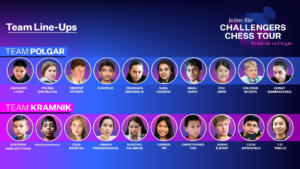A BLESSING IN DISGUISE
In early 2020, the entire world entered a stage of latency with the outbreak of the COVID-19 virus. It went on to become a full-fledged pandemic, and people were forced to stay indoors with restricted access. A lot of industries and interests were hit worldwide with everything shifting online.
While the sports industry came to a standstill, the chess world was also similarly rocked by the Covid-19 pandemic. Offline, over-the-board tournaments stopped completely to an extent that, even the Candidates’ tournament had to be paused, with the tournament poised halfway. However, chess’s USP has been its flexibility and the ability to adapt. The game has survived for several centuries and remains relevant to this day by being moldable according to the change in time and trends, whilst maintaining the integrity of the game by not wavering from its core rules. As soon as the world came to a standstill, chess immediately moved online.
With rising mental tension and restrictions on outdoor activities, people packed inside their four-walled started looking out for various ways to indulge themselves and their kids in mindful practices. This led to an exponential growth in the activity levels of chess-playing servers like chess.com and lichess.org. However, it was not restricted just to the playing platforms. Chess e-learning platform Chessable reported a quadruple increase in its user base from 2020 to 2021. A lot of chess enthusiasts who had lost touch returned to Chess.

Cover of Chess Life magazine during a pandemic
Let us have a look at the key events that got chess to where it stands post-pandemic:
1)The growth of the global chess streaming community
A few years before the pandemic, Twitch and Chesscom entered into a partnership. It had a modest start with elite players like Hikaru Nakamura streaming over it with around 1000 watching. However, with the pandemic, this viewership increased by almost 10-fold and he hit a following of more than 1 million subscribers on both Twitch and YouTube! Globally, Hikaru, Levy Rozman (Gothamchess), and The Botez sisters were some of the popular content creators who contributed to taking the game to the masses and making it accessible and enjoyable to a whole new set of audiences by creating chess content regularly in a fun and educational way.

Hikaru and Botez Sisters in a fun chess stream
This culminated in the PogChamps event, which involved collaboration between the top chess content creators in the world and the most popular content creators globally. Top chess streamers and titled players went on to coach some of the famous social media content creators that played against each other. In fact, by the third season, the prize pool increased to $100,000 as Chess.com noted how previous PogChamps tournaments, as well as other external events such as the success of The Queen’s Gambit, had led to a dramatic increase in the number of site registrations and daily games played, allowing them to gain several sponsorships, which in turn led to an increased prize pool.

2) The growth of the Indian streaming community
IM Sagar Shah and Amruta Mokal were actively involved in popularizing the game of chess in India pre-pandemic by covering all important national and international chess events by being on-site and publishing articles and stories from in and behind the scenes through Chessbase India. However, the pandemic acted like a blessing in disguise for their platform as their viewership and work reached a larger base with their YouTube channel hitting 1M subscribers recently! Sagar Shah started by streaming “Improving Chess” on his channel and with the involvement of star comedians like Samay Raina, Vaibhav Sethia, Biswa Kalyan Rath, the game of chess earned massive reach from a plethora of Indian audiences. It all began with a fun Twitter exchange between GM Vidit Gujrathi and comedians that brought the who’s who of content creation and the comedy industry to the game of chess.
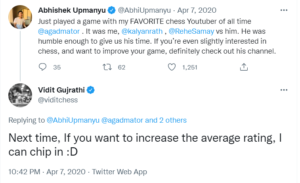
The tweet that ignited the chess fire
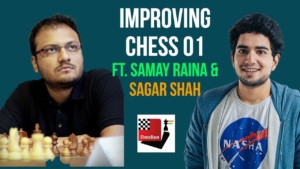
Samay Raina particularly played a huge role in popularizing the game and bringing more celebrities on board and also helped a lot of elite chess players of India in getting into YouTube streaming.
This led to the creation of an online chess tournament series known as Comedians On Board, in which famous comedians and stars of the country were trained by various Indian Grandmasters. A lot of online fund-raiser chess streams were also organized during the pandemic.
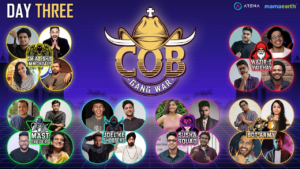
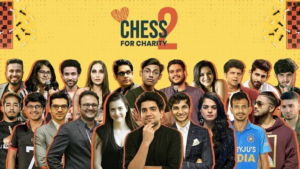
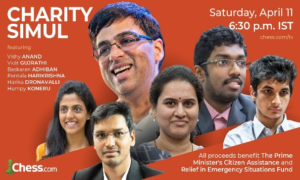
3)The Queen’s Gambit and Online Olympiad
With people and work being confined to laptops and mobile screens during the pandemic, online subscription services came to the rescue for entertainment and chill. With the release of “The Queen’s Gambit”, a drama series on Netflix, a wide range of audiences from all over the globe was attracted to the game of chess which in turn increased the reach of various chess streams and online tournaments being organized.

While other sports events struggled to function at global levels, Chess emerged as a phoenix with the concept of the Online Chess Olympiad, making sure that an elite-level, world-class event was still organized despite all odds. In India, the concurrent viewership reached 70,000 on YouTube streams and people from all walks of life were glued to their screens and watching matches as if it was cricket or football.

The winners of first Online Olympiad
4)The Magnus Carlsen Effect
Magnus proved to be a champion both on and off the board, by launching various chess events and initiatives under his banner. He began in 2020 with a series of Magnus Carlsen Invitational tournaments online with top world chess players being a part of it and it received massive media attention.

Play Magnus Group then came up with the idea of the Meltwater Champions Chess Tour which is a series of chess tournaments throughout the year with the semi-finalists competing for the title at the end. One of the most remarkable initiatives is that of the Julius Baer Challengers Chess Tour with the involvement of Judit Polgar and Kramnik along with top juniors of the world. This tournament does not only focus on junior chess talent but also promotes gender equality by giving equal opportunities to junior players across the globe of both genders.

